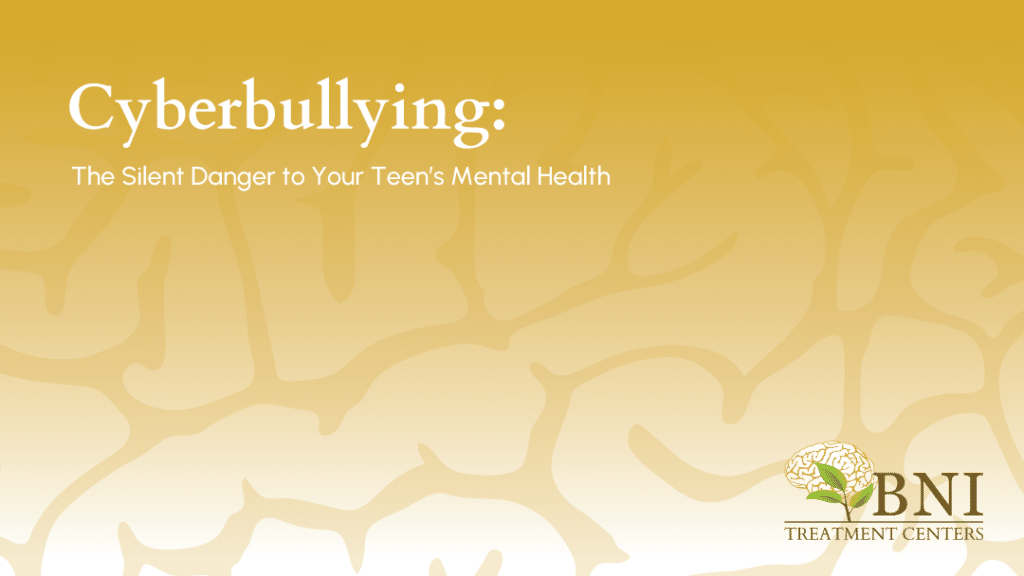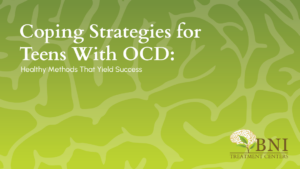
The anonymity that comes with online spaces allows for cruelty without consequences. Youth especially are inclined to stick to their electronics. Bullying among teens is a problem that is all too common. When you combine these two phenomena, you get a rapidly growing issue: cyberbullying.
Like regular bullying, cyberbullying takes a toll on mental health while coming with unique challenges. That’s why BNI Treatment Centers’ psychiatrists are intimately involved in the treatment plans of teens at our facility. This ensures all of their mental health concerns are addressed comprehensively, no matter their cause.
Victims of cyberbullying are more than two times as likely to experience suicidal ideation and self-harm behaviors than non-victims. The dangers of cyberbullying are undeniable, and understanding it on a deeper level is the first step to reducing its impact.
Understanding Cyberbullying
Cyberbullying is defined as repeated intentional harassment and mistreatment that happens over an electronic device. This can be through a phone, computer, or gaming system, and through the internet or text messages.
One instance of cruelty online is not cyberbullying. The situation is still harmful, but bullying is characterized by a pattern of deliberate mistreatment. For example, a teen may receive a hurtful anonymous message. One message isn’t cyberbullying, but if the messages continue, it would qualify.
Unique Characteristics of Cyberbullying
Both bullying and cyberbullying are hurtful, but they also have their differences. Understanding these differences is key to diminishing cyberbullying’s impact on our communities.
Cyberbullying is unique in its anonymity. Bullies can hide behind anonymous messages, aliases, or fake accounts, making it difficult to trace behavior back to the real perpetrator. The victim doesn’t necessarily know who is targeting them either, making the experience both confusing and painful.
While traditional bullying may have witnesses in the school hallway, sometimes the audience for cyberbullying is worldwide. Public cyberbullying can go viral, with thousands of eyes reading the mean comments. The reach is far wider than an incident at school. As such, cyberbullying comes with a unique level of humiliation.
Cyberbullies also benefit from the distance between them and their victims. Because bullies don’t have to see the reactions of their victims online, it’s easier for them to be meaner. They have a screen protecting them from any immediate consequences.
Another challenge of cyberbullying is the lack of adult moderation and intervention. At school, teachers and other staff can respond. Most cyberbullying happens in spaces without adults. In online communities, the only proof of age is a birthday or selfie on a profile. Any adults who are present don’t have the same authority that they would in person, and most aren’t as familiar with online platforms. This makes it hard for them to know how to effectively intervene.

Types of Cyberbullying
Cyberbullying comes in many forms, including hurtful texts, mean comments on social media pages, rumors, circulating embarrassing or false information about someone, posting private images or conversations, impersonation, and excluding someone from a community. Stalking someone online, sending them threats, and posting personal information publicly can also count as cyberbullying.
Consequences of Cyberbullying
Cyberbullying has negative consequences, both for the bullies and their victims. Victims of cyberbullying see a decline in mental health. It can cause depression, anxiety, and low self-esteem. Cyberbullied teens’ grades may worsen, and they can develop interpersonal problems with their families or friends. It impacts every area of their life.
When caught, cyberbullies may lose opportunities, be suspended or expelled from school, and in extreme cases, get in trouble with the law.
Signs Your Teen Is Being Cyberbullied
All teens will react to cyberbullying differently, but some general signs are:
- Avoiding electronic devices
- Getting upset after using their phone, tablet, or computer
- Avoiding talking about what they’re doing online
- Withdrawing from family, friends, and activities
- Avoiding school, going out, or social functions
- Grades declining
- Seeming anxious whenever they get a new notification on their phone
- Getting defensive about their online activities
- General unexplained changes in mood or behavior

How to Help Your Teen if They Are Being Cyberbullied
If you suspect your teen is being cyberbullied, the most important thing is to offer unconditional support. It’s vital for your teen to feel safe and know you’re on their side. They may be reluctant to open up at first, but let them know that if someone is bullying them online, you want to help.
Encourage your teen to keep screenshots of all cyberbullying. If the bully is someone from the teen’s school, contact the school. Let your teen know ahead of time so they can be prepared, and you can come up with a good course of action that makes them feel comfortable.
If the cyberbullying is happening unrelated to school, search for the platform’s harassment policy, and report the bully if possible. Make sure your teen sends all the screenshots and evidence they can. Then, suggest they block the person cyberbullying them, and no longer engage with them. If the cyberbullying involves threats, blackmail, or stalking, contacting law enforcement may be appropriate.
Cyberbullying takes a toll on victims, and finding your teen additional support is beneficial, especially if they have mental health concerns. Mental health treatment or counseling can help rebuild your teen’s confidence and sense of security.
BNI Treatment Centers is a mental health center treating teens ages 12-17. Whether their concern is cyberbullying or a more complex mental health condition is at play, our expert psychiatrists are here for your teen’s treatment, and to empower them to be the best version of themselves. Call us at (888) 522-1504 for more information.
BNI Treatment Centers: Science-based, evidence-backed, compassion-led.



